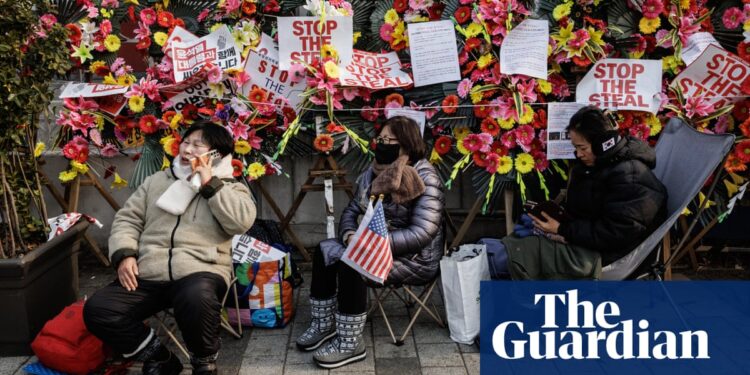The first hearing in the impeachment trial of South Korea’s suspended president, Yoon Suk Yeol, ended after just a few minutes on Tuesday as Yoon failed to appear at the constitutional court.
The court’s justices have about five months to decide whether to strip Yoon of his presidential duties over his short-lived declaration of martial law on 3 December or return him to office.
Yoon’s power grab plunged South Korea into its worst political crisis in decades, after he directed soldiers to storm parliament in an unsuccessful bid to stop lawmakers voting down his suspension of civilian rule.
The national assembly voted to impeach him in mid-December, triggering weeks of uncertainty in which Yoon, an ultra-conservative, has gone to ground inside the presidential residence, refusing summonses from investigators probing him on insurrection charges in a separate case, and using his presidential security team to resist arrest.
Yoon’s legal team had said he would not appear at the first hearing over purported safety concerns, but would be willing to appear at a later date if security issues were resolved. “Concerns about safety and potential incidents have arisen. Therefore, the president will not be able to attend the trial on January 14,” lawyer Yoon Kab-keun said. The trial will continue in his absence if he does not appear.
Yoon’s absence is not unprecedented: Roh Moo-hyun did not appear at his impeachment trial in 2004, and Park Geun-hye shunned her trials in 2016-2017.
Lawmakers also impeached Yoon’s immediate replacement, Han Duck-soo, last month, while the current acting president, Choi Sang-mok, has appeared unwilling to wade into the standoff, instead urging all parties to negotiate for a solution.
The trial’s first hearing – out of five lasting until early February – began at 2pm on Tuesday but was quickly adjourned due to Yoon’s absence.
The next hearings are scheduled to take place on 16, 21 and 23 January, and 4 February. Media reports said the court would hear “more substantive arguments” at the next session on Thursday, but it was still not clear if Yoon would attend.
Legal experts say the court will decide two issues: whether Yoon’s martial law declaration was constitutional and, if not, whether it amounted to insurrection.
“This impeachment case focuses solely on the martial law situation, so the facts are not particularly complex,” lawyer Kim Nam-ju told Agence France-Presse.
The court has 180 days to make its ruling, starting from 14 December, when it received the case on whether Yoon violated the constitution and the martial law act. His lawyers have argued the court must utilise the full 180 days – specifically to examine what “led to the declaration of martial law”.
The legal process has been complicated by the nine-member court’s composition. It currently has eight justices, at least six of whom must uphold the national assembly vote for Yoon to be thrown out of office. The acting president, Choi Sang-mok, has urged the ruling and opposition parties to quickly agree on the appointment of a ninth candidate, Ma Eun-hyuk.
Separate from the trial, police and a joint team of investigators from the Corruption Investigation Office (CIO) – which is probing Yoon over allegations of insurrection – are preparing a fresh attempt to arrest Yoon.
An earlier attempt failed after Yoon’s presidential guards blocked the investigators.
If the new warrant is executed successfully, Yoon would become the first sitting South Korean president to be arrested. If eventually convicted in that case, Yoon could face prison or even the death penalty.
The CIO said it would “prepare thoroughly” for its second attempt to arrest Yoon and warned that anyone obstructing investigators could be detained.
The National Office of Investigation, a police unit, sent a note to high-ranking police officials in Seoul requesting they prepare to mobilise 1,000 investigators for the fresh attempt, the Yonhap news agency reported.
Meanwhile, Yoon’s guards have reinforced his Seoul compound with barbed wire installations and bus barricades. His legal team has also sought to pressure police not to be involved in the arrest attempt.
Yoon’s lawyers released a statement on Tuesday saying officers would be “in violation of multiple laws” if they proceeded to execute the “illegal warrant” to detain Yoon. “We strongly urge the police, who are not obligated to follow investigative directives from the CIO, not to degrade themselves into mere enforcers of illegal actions.”
On Sunday, the CIO sent a letter to the defence ministry and presidential security service saying anyone blocking Yoon’s potential arrest may face criminal charges for obstruction and abuse of authority.
With Agence France-Presse






